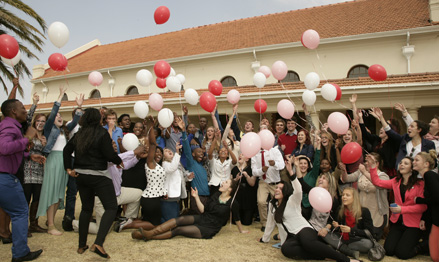Latest News Archive
Please select Category, Year, and then Month to display items
12 January 2024
|
Story Nonsindiswe Qwabe
|
Photo Sonia Small
 Since joining the UFS in 2008, Dr Grey Magaiza has worked extensively on approaches that can foster the socio-economic transformation of societies.
Since joining the UFS in 2008, Dr Grey Magaiza has worked extensively on approaches that can foster the socio-economic transformation of societies.
“The future should be one where communities can decide on their development agenda and futures. That’s the most important for me.” Dr Grey Magaiza, Deputy Director of the Centre for Gender and Africa Studies (CGAS) and Head of the Community Development programme on the Qwaqwa Campus, is passionate about capacitating communities to be agents of change and advancement. His vision for the future emphasises the empowerment of communities to take charge of their development by actively participating in decision making and the implementation of development projects that can improve their lives.
Since joining the UFS in 2008, Dr Magaiza has worked extensively on approaches that can foster the socio-economic transformation of societies. Over the years, he has crafted his research speciality into one that he is most proud of – being an interdisciplinary scientist immersed in the development of communities.
“I’m in a fortunate position of researching what I like. I say ‘fortunate’, because I’ve taken the time to understand what I’m passionate about, which is the overall field of rural livelihoods and livelihood futures – in short, community development. My research starts from an engaged university, understanding the elements that a university must use to enhance transformation and relevance to its immediate community in terms of development.”
One of the ways he has done this is by looking at social entrepreneurship as a development approach for young people in a rural setting. Through workshops with non-profit and civic organisations in Qwaqwa, Dr Magaiza has been helping these organisations to map out their needs and actively meet them through the involvement and support of external role players.
“We understand that communities are part of the national development agenda, but even that national agenda respects community knowledge and intentions and allows communities to shape their identity. A critical enabler of this is community organising. You bring back the capacity in communities to have dialogues on issues affecting them as spaces for engagement, knowledge exchange, and for people to just talk about their way forward.”
By enabling communities to define their development agenda, they can address their specific needs, challenges, and aspirations, he said. “When I look at livelihood futures, it’s quite an exciting aspect of my work – it’s like looking into a fortune tellers’ globe, because you’re not deciding for communities what they should do, but the communities themselves take those decisions.”
‘Your capacity for change is limitless’
2013-09-13
|
 |
Ready for the world - students taking part in the 2013 Leadership for Change programme getting ready to travel to universities in the USA, Europe and Asia.
Photo: Johan Roux
12 September 2013 |
“You will change this campus, city, country, continent and the world, because you have the capacity for greatness,” Prof Jonathan Jansen, Vice-Chancellor and Rector of the University of the Free State (UFS), said.
He addressed the 2013 group of first-year students in the Leadership for Change programme at a farewell function before they will leave for universities abroad. The first 104 students from the 2013 total of 144 will depart on 18 September and return on 3 October 2013. The second group of 40 students will be abroad from 11 to 25 January 2014. The students are from the Bloemfontein and Qwaqwa Campuses. They will be accompanied by mentors from the UFS.
The students will visit 17 universities in the USA, Europe and Asia.
The first 71 first-year students in the Leadership for Change programme were sent abroad for two weeks in September 2010 to get intense exposure to the academic, social, cultural and residential lives of students in the USA. In 2011 the student number more than doubled and universities in Europe were included. In July 2012 the programme brought students from around the globe to the UFS for the Global Leadership Summit.
Prof Jansen inspired the young leaders, saying, “If you learn leadership values in your four years of study, a change will come. Build the new value system and take it into the country. Your capacity for change is limitless.”
He encouraged them to learn to know the stranger, not only abroad, but also the beggar at the street corner. “Learn to be comfortable with the beggar, as well as with the professor in the classroom.”
A stringent evaluation and training programme preceded the group’s visit abroad, and Prof Jansen could not formulate their achievement better: “I cannot tell you how proud I am of you.”